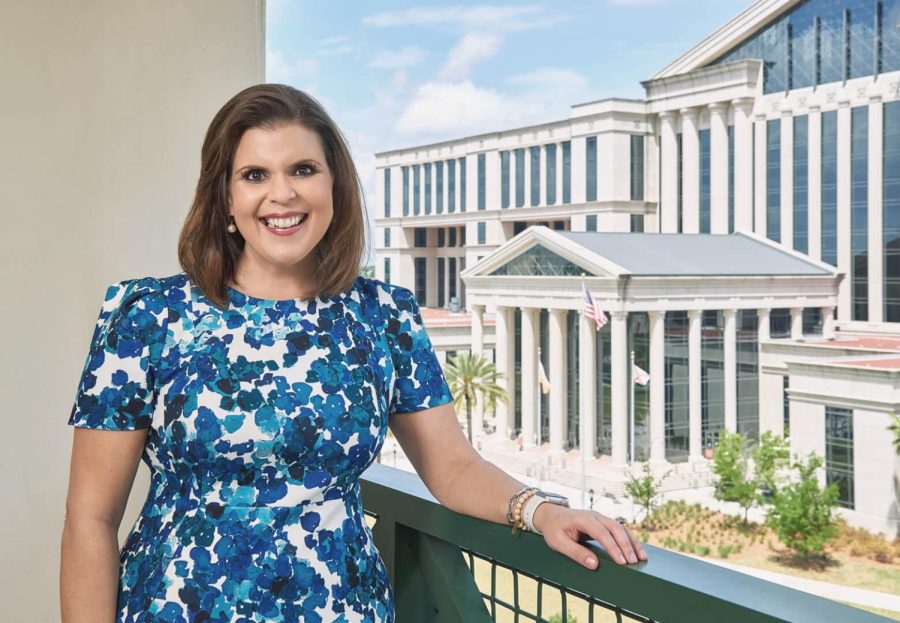Tygart ’98 Takes the Bench
Lindsay Tygart outside the Duval County Courthouse. Credit: Attorney At Law Magazine
Lindsay Tygart ‘98 has spent over a decade working as a medical and malpractice attorney, but as of January 3, 2023 she will ascend to a new position as a judge and preside over criminal cases.
After graduating in ‘98, Tygart attended the University of North Carolina Chapel Hill and worked in the Public Defender’s office before enrolling at Florida Coastal Law School.
But, Tygart’s career path wasn’t always straightforward. She majored in performing arts in college after being exposed to the subject at Bolles, “I met Michael Fritton and sort of developed this passion for doing that, and performing in front of people, public speaking, and playing these parts and getting into these characters,” Tygart said. She also credits the English department for her successes as a lawyer, “learning to write, and learning to communicate with people through writing and putting your thoughts on paper had a huge influence on me,” she said.
“To help people who couldn’t help themselves.” — Lindsay Tygart ‘98
After college Tygart decided to move back to Jacksonville and become a lawyer. She first worked in the public defender’s office, “it was pretty much the coolest job I’ve ever done in my life,” she said. There, she worked in the investigations department and focused on providing counsel for those in need.
“It was pretty much the coolest job I’ve ever done in my life.” — Lindsay Tygart ‘98
Later she transitioned to medical and malpractice law at Coker Law. She said it’s an “incredibly specialized” field and a “niche practice.” She continued, “There’s very few people in the North Florida area that do it. And there are a fraction of females who do it. And to kind of be a female lawyer is a unique, special, amazing thing.”
As a female lawyer, Tygart experienced her fair share of discrimination in the workplace. She’s been told to “not get personally involved in cases” and “not get emotional.” To which she responds, “How dare you? I mean, that’s what makes me a good warrior. That’s what makes me empathize with people. That’s what gives me passion, fire. And that’s what makes me want to fight for you.”
She continues to defy this double standard as one of the few women in her field and uses her passion to fight for her clients.
“To kind of be a female lawyer is a unique, special, amazing thing.” — Lindsay Tygart ‘98
She describes her work as “the greatest possible thing” and “the greatest possible feeling.”
After working for over a decade as a trial lawyer, Tygart made the decision to try and run for election as a judge. Though she loved her job as an attorney, she felt that “at the end of the day, Jacksonville is my home, I love this community. I was born and raised here, my family is here, my husband and I have chosen to raise our little girls here. And for me, this is just a different way for me to kind of give back to the community on a larger scale.” She wants to make a difference, “any little tiny part that I can play in making our city better, making our communities safer, making our community better. I want to be a part of that,” Tygart said.
The process of becoming a judge at the state or local level occurs one of two ways: running in a general election or appointment by the governor. Tygart “believed in the election process” and wanted to avoid politics, “I don’t necessarily think that that is the best way to get the most qualified candidates and the most qualified judges on our bench is to essentially have them selected by our governor.”
Tygart put her name in the running for an open seat, meaning a judge on the bench was retiring and also meaning it was an open ballot. After some back and forth, Tygart ran uncontested and won the seat.
“Any little tiny part I can play in making our city better, making out communities safer, making our community better. I want to be a part of that.” — Lindsay Tygart ‘98
On January 3, 2023, Tygart’s official six year term begins and she can continue to pursue the reason she went to law school, “to help people who couldn’t help themselves.”



